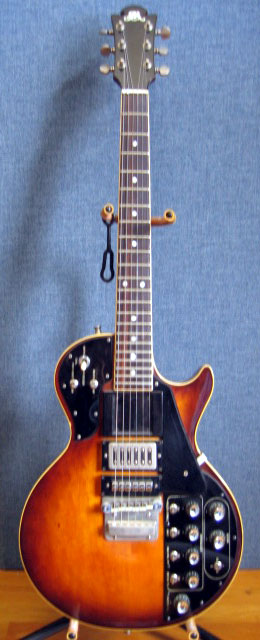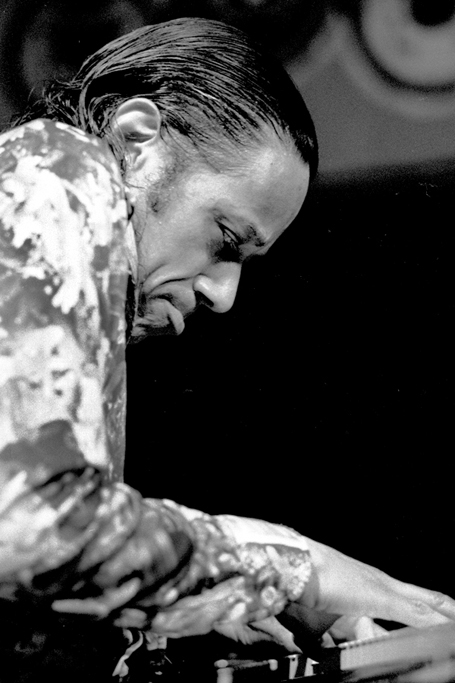|
Rejoicing (album)
''Rejoicing'' is an album by the guitarist Pat Metheny that was released in 1984 by ECM. It features the guitarist in a trio with Charlie Haden on bass and Billy Higgins on drums, both of whom played and recorded with Ornette Coleman in the late 1950s and early 1960s. In addition to his own compositions, Metheny plays three compositions by Coleman, and Horace Silver's "Lonely Woman" (not to be confused with the Coleman composition of the same title, which Metheny does not play on the album). Reception Scott Yanow of AllMusic gave the album 4.5 stars and said, "Throughout this excellent set, Metheny and his sidemen engage in close communication and create memorable and unpredictable music."Yanow, S. Allmusic Review: ''Rejoicing''accessed 8 May 2011 Track listing Personnel * Pat Metheny – acoustic and electric guitars, guitar synthesizer * Charlie Haden – double bass * Billy Higgins Billy Higgins (October 11, 1936 – May 3, 2001) was an American jazz drummer. He p ... [...More Info...] [...Related Items...] OR: [Wikipedia] [Google] [Baidu] |
Pat Metheny
Patrick Bruce Metheny ( ; born August 12, 1954) is an American jazz guitarist and composer. He is the leader of the Pat Metheny Group and is also involved in duets, solo works, and other side projects. His style incorporates elements of progressive and contemporary jazz, latin jazz, and jazz fusion. Metheny has three gold albums and 20 Grammy Awards and is the only person to win Grammys in 10 categories. He is the younger brother of jazz flugelhornist Mike Metheny. Biography Early years and education Metheny was born in Lee's Summit, Missouri. His father Dave played trumpet, his mother Lois sang, and his maternal grandfather Delmar was a professional trumpeter. Metheny's first instrument was trumpet, which he was taught by his brother, Mike. His brother, father, and grandfather played trios together at home. His parents were fans of Glenn Miller and swing music. They took Metheny to concerts to hear Clark Terry and Doc Severinsen, but they had little respect for guitar. ... [...More Info...] [...Related Items...] OR: [Wikipedia] [Google] [Baidu] |
Charlie Haden
Charles Edward Haden (August 6, 1937 – July 11, 2014) was an American jazz double bass player, bandleader, composer and educator whose career spanned more than 50 years. In the late 1950s, he was an original member of the ground-breaking Ornette Coleman Quartet. Haden revolutionized the harmonic concept of bass playing in jazz. German musicologist Joachim-Ernst Berendt wrote that Haden's "ability to create serendipitous harmonies by improvising melodic responses to Coleman's free-form solos (rather than sticking to predetermined harmonies) was both radical and mesmerizing. His virtuosity lies (…) in an incredible ability to make the double bass 'sound out'. Haden cultivated the instrument's gravity as no one else in jazz. He is a master of simplicity which is one of the most difficult things to achieve." Haden played a vital role in this revolutionary new approach, evolving a way of playing that sometimes complemented the soloist and sometimes moved independently. In thi ... [...More Info...] [...Related Items...] OR: [Wikipedia] [Google] [Baidu] |
1983 Albums
The year 1983 saw both the official beginning of the Internet and the first mobile cellular telephone call. Events January * January 1 – The migration of the ARPANET to TCP/IP is officially completed (this is considered to be the beginning of the true Internet). * January 24 – Twenty-five members of the Red Brigades are sentenced to life imprisonment for the 1978 murder of Italian politician Aldo Moro. * January 25 ** High-ranking Nazi war criminal Klaus Barbie is arrested in Bolivia. ** IRAS is launched from Vandenberg AFB, to conduct the world's first all-sky infrared survey from space. February * February 2 – Giovanni Vigliotto goes on trial on charges of polygamy involving 105 women. * February 3 – Prime Minister of Australia Malcolm Fraser is granted a double dissolution of both houses of parliament, for elections on March 5, 1983. As Fraser is being granted the dissolution, Bill Hayden resigns as leader of the Australian Labor Party, and in the subsequent lea ... [...More Info...] [...Related Items...] OR: [Wikipedia] [Google] [Baidu] |
Guitar Synthesizer
A guitar synthesizer is any one of a number of musical instrument systems that allow a guitarist to access synthesizer capabilities. Overview Today's guitar synths are direct descendants of 1970s devices from manufacturers (often in partnership) such as Hammond Innovex and Ovation, Ludwig, EMS, 360 Systems, Norlin Music and Maestro, Ampeg and Hagström, Arp, Roland Corporation and FujiGen ( GR-500 and GR-300), New England Digital, Electro-Harmonix, Casio, Terratec/Axon, Starr Labs, Ibanez, Holt Electro Acoustic Research, Zeta Systems, and Yamaha. In the early days, there were three main types of guitar-synthesizers: * Multi-effects type * Frequency-to-voltage converter type (using guitar with pickups) * Guitorgan type (using guitar with fretboard switches) Later, the multi-effects type evolved into modeling guitar, and the other two types evolved into current devices. Presently, there are two main groups: * Guitar-synth using guitars: regular guitars equipped with ... [...More Info...] [...Related Items...] OR: [Wikipedia] [Google] [Baidu] |
Scott Yanow
Scott Yanow (born October 4, 1954) is an American jazz reviewer, historian, and author.Allmusic Biography/ref> Biography Yanow was born in New York City and grew up near Los Angeles. Since 1974, he was a regular reviewer of many jazz styles and was the jazz editor for ''Record Review.'' He wrote for many jazz and arts magazines, including ''JazzTimes'', ''Jazziz'', ''Down Beat'', ''Cadence'', ''CODA'' and the ''Los Angeles Jazz Scene''. In September 2002, Yanow was interviewed on-camera by CNN about the Monterey Jazz Festival and wrote an in-depth biography on Dizzy Gillespie for AllMusic.com. He authored 12 books on jazz (including 2022's Life Through The Eyes Of A Jazz Journalist), over 900 liner notes for CDs and over 20,000 reviews of jazz recordings. Yanow was a contributor to and co-editor of the third edition of the ''All Music Guide to Jazz''. He continues to write for ''Downbeat, Jazziz'', the ''Los Angeles Jazz Scene'', "Syncopated Times," "Jazz Artistry Now," the ''J ... [...More Info...] [...Related Items...] OR: [Wikipedia] [Google] [Baidu] |
Lonely Woman (composition)
"Lonely Woman" is a jazz composition by Ornette Coleman. Coleman's recording of it was the opening track on his 1959 Atlantic Records album ''The Shape of Jazz to Come''. Alongside Coleman's alto saxophone, the recording featured Don Cherry on cornet, Charlie Haden on double bass and Billy Higgins on drums. Origin In an interview with Jacques Derrida, Coleman spoke of the origin of the composition: Other versions Haden and Cherry revisited the song on ''Old and New Dreams'' (ECM, 1979), Haden doing so again on '' Etudes'' (1987) and '' In Angel City'' (1988). Pianist John Lewis first recorded the song in January 1962 with the Modern Jazz Quartet for their album of the same name which was one of the earliest recorded covers of a Coleman number.jazzdisco.org entry for Lonely Woman ... [...More Info...] [...Related Items...] OR: [Wikipedia] [Google] [Baidu] |
Song For My Father (album)
''Song for My Father'' is a 1965 album by the Horace Silver Quintet, released on the Blue Note label in 1965. The album was inspired by a trip that Silver had made to Brazil. The cover artwork features a photograph of Silver's father, John Tavares Silver, to whom the title composition was dedicated. "My mother was of Irish and Negro descent, my father of Portuguese origin," Silver recalls in the liner notes: "He was born on the island of Maio, one of the Cape Verde Islands." Music and reception The composition "Song for My Father" is probably Silver's best known. As described in the liner notes, this album features the leader's quintet in transition as it features a mix of tracks featuring his old group and his new line-up after Blue Mitchell had left. AllMusic reviewer Steve Huey praised the album: One of Blue Note's greatest mainstream hard bop dates, ''Song for My Father'' is Horace Silver's signature LP and the peak of a discography already studded with classics...it hang ... [...More Info...] [...Related Items...] OR: [Wikipedia] [Google] [Baidu] |
Horace Silver
Horace Ward Martin Tavares Silver (September 2, 1928 – June 18, 2014) was an American jazz pianist, composer, and arranger, particularly in the hard bop style that he helped pioneer in the 1950s. After playing tenor saxophone and piano at school in Connecticut, Silver got his break on piano when his trio was recruited by Stan Getz in 1950. Silver soon moved to New York City, where he developed a reputation as a composer and for his bluesy playing. Frequent sideman recordings in the mid-1950s helped further, but it was his work with the Jazz Messengers, co-led by Art Blakey, that brought both his writing and playing most attention. Their ''Horace Silver and the Jazz Messengers'' album contained Silver's first hit, " The Preacher". After leaving Blakey in 1956, Silver formed his own quintet, with what became the standard small group line-up of tenor saxophone, trumpet, piano, bass, and drums. Their public performances and frequent recordings for Blue Note Records increased Silver ... [...More Info...] [...Related Items...] OR: [Wikipedia] [Google] [Baidu] |
Ornette Coleman
Randolph Denard Ornette Coleman (March 9, 1930 – June 11, 2015) was an American jazz saxophonist, violinist, trumpeter, and composer known as a principal founder of the free jazz genre, a term derived from his 1960 album '' Free Jazz: A Collective Improvisation''. His pioneering performances often abandoned the chordal and harmony-based structure found in bebop, instead emphasizing a jarring and avant-garde approach to improvisation. AllMusic called him "one of the most important (and controversial) innovators of the jazz avant-garde". Born in Fort Worth, Texas, Coleman began his musical career playing in local R&B and bebop groups, and eventually formed his own group in Los Angeles featuring members such as Ed Blackwell, Don Cherry, Charlie Haden, and Billy Higgins. In 1959, he released the controversial album ''The Shape of Jazz to Come'' and began a long residency at the Five Spot jazz club in New York City. His 1960 album ''Free Jazz'' would profoundly influence the di ... [...More Info...] [...Related Items...] OR: [Wikipedia] [Google] [Baidu] |
Billy Higgins
Billy Higgins (October 11, 1936 – May 3, 2001) was an American jazz drummer. He played mainly free jazz and hard bop. Biography Higgins was born in Los Angeles, California, United States. Higgins played on Ornette Coleman's first records, beginning in 1958. He then freelanced extensively with hard bop and other post- bop players, including Donald Byrd, Dexter Gordon, Grant Green, Herbie Hancock, Joe Henderson, Don Cherry, Paul Horn, Milt Jackson, Jackie McLean, Pat Metheny, Hank Mobley, Thelonious Monk, Lee Morgan, David Murray, Art Pepper, Sonny Rollins, Mal Waldron, and Cedar Walton. He was one of the house drummers for Blue Note Records and played on dozens of Blue Note albums of the 1960s. He also collaborated with composer La Monte Young and guitarist Sandy Bull. In his career, he played on over 700 recordings, including recordings of rock and funk. He appeared as a jazz drummer in the 2001 movie, ''Southlander''. In 1989, Higgins cofounded a cultural cente ... [...More Info...] [...Related Items...] OR: [Wikipedia] [Google] [Baidu] |
Penguin Books
Penguin Books is a British publishing, publishing house. It was co-founded in 1935 by Allen Lane with his brothers Richard and John, as a line of the publishers The Bodley Head, only becoming a separate company the following year."About Penguin – company history" , Penguin Books. Penguin revolutionised publishing in the 1930s through its inexpensive paperbacks, sold through Woolworths Group (United Kingdom), Woolworths and other stores for Sixpence (British coin), sixpence, bringing high-quality fiction and non-fiction to the mass market. Its success showed that large audiences existed for serious books. It also affected modern British popular culture significantly through its books concerning politics, the arts, and science. Penguin Books is now an imprint (trade name), imprint of the ... [...More Info...] [...Related Items...] OR: [Wikipedia] [Google] [Baidu] |






